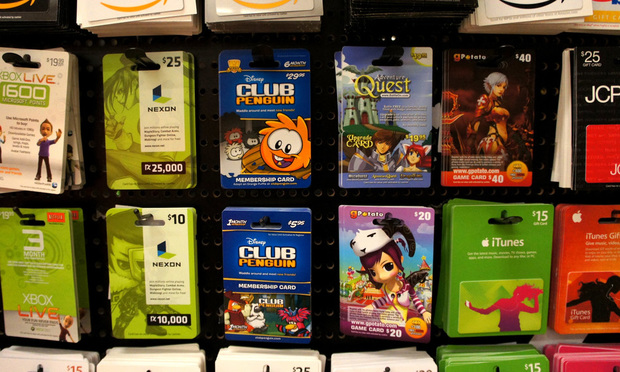Daily Dicta: New ADA Shakedown? Dozens of Merchants Sued for Failing to Offer Gift Cards in Braille
Plaintiffs lawyers are testing a new theory that store gift cards are a "public accommodation" and subject to the ADA. Or not.
October 31, 2019 at 02:48 AM
4 minute read
 gift-cards
gift-cards
More than 60 retailers, restaurant chains and movie theatres in the past week have been hit with cookie-cutter class actions in the Southern District of New York testing a novel legal theory: that the merchants' gift cards violate the Americans with Disabilities Act because they don't have writing in Braille.
We're talking Nordstrom and Macys; CVS and Walgreens; Regal Cinemas and AMC Entertainment; McDonalds and Burger King; Whole Foods and Trader Joes; Home Depot and Bed Bath & Beyond; Petsmart and Build-a-Bear; Olive Garden and Applebee's.
Just visualize a well-stocked gift card display and sue everyone but Starbucks—allegedly the only merchant that offers gift cards with Braille.
Gift cards are big business, with $400 billion in sales in 2019, according to the plaintiffs. Citing an industry survey, they said gift cards for nine years running have been the most requested gift.
 But are they actually covered by the ADA? Is a store gift card a "public accommodation"?
But are they actually covered by the ADA? Is a store gift card a "public accommodation"?
Certainly the restaurant or store or theater where you'd go to spend the gift card must be ADA-compliant. But the card itself?
The plaintiffs, represented by Bradley Marks of the Marks Law Firm and Jeffrey Gottlieb of Gottlieb & Associates, argue that when a defendant (this particular complaint is against Victoria's Secret, but they're all almost exactly the same) fails to "remove access barriers to its store gift cards, plaintiff and visually-impaired persons have been and are still being denied equal access to defendant's retail stores and the numerous goods, services, and benefits offered to the public through the defendant's store gift cards."
Title III of the ADA requires that public accommodations provide "appropriate auxiliary aids and services where necessary to ensure effective communication with individuals with disabilities," they note, arguing that gift cards are one such aid or service. They also claim that the Braille-less gift cards violate the New York State Human Rights Law and the New York City Human Rights Law.
"Without injunctive relief, plaintiff and other visually-impaired consumers will continue to be unable to independently use the store gift cards, violating their rights," they wrote.
But (surprise!) the lawyers want more than injunctive relief. They're also asking for compensatory damages, civil penalties under the New York human rights laws for each offense, attorneys' fees and costs.
Marks and Gottlieb did not respond to a request for comment.
Morgan, Lewis & Bockius partner Anne Marie Estevez, who co-chairs the firm's retail & eCommerce industry initiative, argues that the ADA is about accessibility to places—it doesn't cover goods. And if it did, where would it stop? If a gift card has to be in Braille, what about the label on a box of chocolates? Or every other consumer product?
"They are trying to stretch the law to places no one reasonably contemplated could be covered," she said.
In an amendment to the ADA, the feds specified that ATM machines must have Braille writing. But Estevez noted legislators have said nothing about gift cards in Braille. "If the government wants to do that, they know how," she said.
Also, there's this: Less than 10% of the 1.3 million legally blind people in America can read Braille according to the National Federation of the Blind.
This content has been archived. It is available through our partners, LexisNexis® and Bloomberg Law.
To view this content, please continue to their sites.
Not a Lexis Subscriber?
Subscribe Now
Not a Bloomberg Law Subscriber?
Subscribe Now
NOT FOR REPRINT
© 2025 ALM Global, LLC, All Rights Reserved. Request academic re-use from www.copyright.com. All other uses, submit a request to [email protected]. For more information visit Asset & Logo Licensing.
You Might Like
View All
How Kirkland Litigators and Restructuring Lawyers Partner on Bankruptcy Work

Litigators of the Week: Hitting Walmart With a $100M Verdict in Its Own Backyard

Litigator of the Week: Standing Strong for Under Armour's Trademarks Without Going Overboard Against Upstart Armorina

How a Luxury Designer Made the Case 'Adidas Does Not Own Stripes'
Trending Stories
- 1'It's Not Going to Be Pretty': PayPal, Capital One Face Novel Class Actions Over 'Poaching' Commissions Owed Influencers
- 211th Circuit Rejects Trump's Emergency Request as DOJ Prepares to Release Special Counsel's Final Report
- 3Supreme Court Takes Up Challenge to ACA Task Force
- 4'Tragedy of Unspeakable Proportions:' Could Edison, DWP, Face Lawsuits Over LA Wildfires?
- 5Meta Pulls Plug on DEI Programs
Who Got The Work
Michael G. Bongiorno, Andrew Scott Dulberg and Elizabeth E. Driscoll from Wilmer Cutler Pickering Hale and Dorr have stepped in to represent Symbotic Inc., an A.I.-enabled technology platform that focuses on increasing supply chain efficiency, and other defendants in a pending shareholder derivative lawsuit. The case, filed Oct. 2 in Massachusetts District Court by the Brown Law Firm on behalf of Stephen Austen, accuses certain officers and directors of misleading investors in regard to Symbotic's potential for margin growth by failing to disclose that the company was not equipped to timely deploy its systems or manage expenses through project delays. The case, assigned to U.S. District Judge Nathaniel M. Gorton, is 1:24-cv-12522, Austen v. Cohen et al.
Who Got The Work
Edmund Polubinski and Marie Killmond of Davis Polk & Wardwell have entered appearances for data platform software development company MongoDB and other defendants in a pending shareholder derivative lawsuit. The action, filed Oct. 7 in New York Southern District Court by the Brown Law Firm, accuses the company's directors and/or officers of falsely expressing confidence in the company’s restructuring of its sales incentive plan and downplaying the severity of decreases in its upfront commitments. The case is 1:24-cv-07594, Roy v. Ittycheria et al.
Who Got The Work
Amy O. Bruchs and Kurt F. Ellison of Michael Best & Friedrich have entered appearances for Epic Systems Corp. in a pending employment discrimination lawsuit. The suit was filed Sept. 7 in Wisconsin Western District Court by Levine Eisberner LLC and Siri & Glimstad on behalf of a project manager who claims that he was wrongfully terminated after applying for a religious exemption to the defendant's COVID-19 vaccine mandate. The case, assigned to U.S. Magistrate Judge Anita Marie Boor, is 3:24-cv-00630, Secker, Nathan v. Epic Systems Corporation.
Who Got The Work
David X. Sullivan, Thomas J. Finn and Gregory A. Hall from McCarter & English have entered appearances for Sunrun Installation Services in a pending civil rights lawsuit. The complaint was filed Sept. 4 in Connecticut District Court by attorney Robert M. Berke on behalf of former employee George Edward Steins, who was arrested and charged with employing an unregistered home improvement salesperson. The complaint alleges that had Sunrun informed the Connecticut Department of Consumer Protection that the plaintiff's employment had ended in 2017 and that he no longer held Sunrun's home improvement contractor license, he would not have been hit with charges, which were dismissed in May 2024. The case, assigned to U.S. District Judge Jeffrey A. Meyer, is 3:24-cv-01423, Steins v. Sunrun, Inc. et al.
Who Got The Work
Greenberg Traurig shareholder Joshua L. Raskin has entered an appearance for boohoo.com UK Ltd. in a pending patent infringement lawsuit. The suit, filed Sept. 3 in Texas Eastern District Court by Rozier Hardt McDonough on behalf of Alto Dynamics, asserts five patents related to an online shopping platform. The case, assigned to U.S. District Judge Rodney Gilstrap, is 2:24-cv-00719, Alto Dynamics, LLC v. boohoo.com UK Limited.
Featured Firms
Law Offices of Gary Martin Hays & Associates, P.C.
(470) 294-1674
Law Offices of Mark E. Salomone
(857) 444-6468
Smith & Hassler
(713) 739-1250






